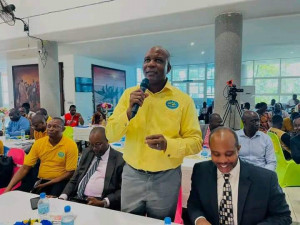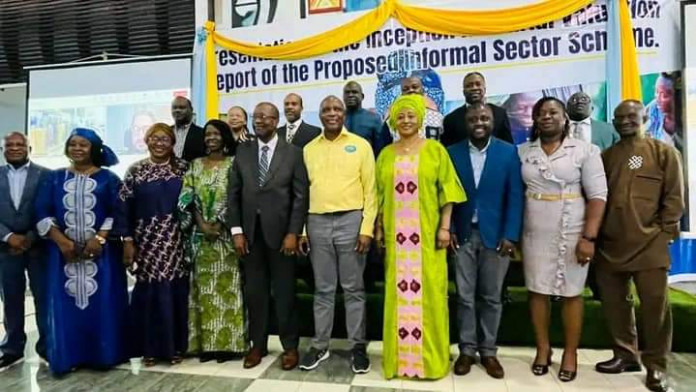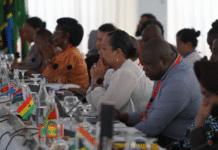By Foday Moriba Conteh
The National Social Security and Insurance Trust (NASSIT), in collaboration with the Ministry of Employment, Labour and Social Security and key stakeholders from the informal sector, officially received the Inception Valuation Report for the proposed Informal Sector Scheme on Thursday, September 5, 2024, at the Freetown International Conference Centre. The report was prepared by Consultant Actuaries, marking a significant step toward extending social security coverage to the vast majority of Sierra Leoneans.
This landmark event attracted a diverse audience, including Government Ministers, development partners, civil society organizations, informal sector stakeholders and media representatives. It is seen as a precursor to expanding social security coverage across the country.
The Minister of Employment, Labour and Social Security, Mohamed Rahman Swarray, who also chairs the Steering Committee for the Informal Sector Scheme Project, expressed his satisfaction with this critical milestone. He emphasized that the expansion of social security to the informal sector has been a long-standing goal for His Excellency, President Julius Maada Bio and he assured the Government’s full support for its implementation. He also commended NASSIT’s Board, Management and Staff for their dedication and urged them to expedite the process of extending coverage.
Delivering the keynote address, NASSIT Director General, Mohamed Fuaad Daboh underscored the economic importance of the informal sector, which plays a vital role in job creation and economic development. He noted that the informal economy includes small-scale traders, artisans, street vendors and other self-employed individuals who operate outside the formal structures of the economy.
The Director General reflected on NASSIT’s journey since its establishment nearly 22 years ago, noting that it primarily covers the formal sector, which accounts for less than 10% of Sierra Leone’s active labour force. He pointed out that by 2007, the registration of eligible members in the formal scheme had nearly reached saturation. Mohamed Fuaad Daboh said recognizing the need to expand coverage to the informal sector, efforts were made in the past but faced administrative hurdles.
“When I assumed office as Director General, the ambition to move forward with the informal sector expansion was reignited, driven by the vision of His Excellency, President Bio,” Mohamed Daboh explained. He added that NASSIT’s 2019 Strategic Plan prioritized this expansion as a flagship program and a dedicated in-house Technical Committee was established to review past efforts and develop strategies to achieve the goal.
According to him, through collaboration with the International Labour Organization (ILO), NASSIT engaged in 2020 to secure technical support for expanding coverage to the informal sector. This led to the creation of the Ministerial Steering Committee and the Technical Committee in April 2023.
He revealed how these Committees have been instrumental in advancing the project, working closely with ILO experts and together they conducted a diagnostic study on the situation of workers and economic units in the informal economy, engaged over 60 informal sector groups to validate focus group findings and hired ILO Actuaries to perform an actuarial valuation of the proposed scheme. This valuation will help define the benefit package and make long-term projections, he maintained.
Mohamed Fuaad Daboh outlined several critical next steps, including nationwide stakeholder engagement, developing a framework for the scheme, obtaining Cabinet approval and setting up operational offices across the country. He expressed gratitude to President Bio, Minister Swarray, the ILO, the World Bank and all other partners who have contributed to the success of the initiative.
ILO Consultant, Damien Bachiebbi, who played a key role in the process, commended the political will demonstrated by the Sierra Leonean Government, emphasizing its importance for the success of the scheme. He acknowledged that designing a scheme for the informal sector poses challenges but expressed optimism that it would protect the rights and interests of informal sector workers and enhance human capital development.
UNDP Economic Adviser, Mabulara Tsuene, also spoke at the event, highlighting the vulnerabilities faced by informal sector workers, particularly during crises like the COVID-19 pandemic. She emphasized the importance of extending social security to this group, not only to mobilize revenue and promote inclusive financial services but also to mitigate the high risks associated with their work. Mabulara Tsuene reaffirmed UNDP’s commitment to working with NASSIT, stakeholders and the Government to make this scheme a model for Africa.
Hon. Rebecca Yei Kamara, Chair of the Parliamentary Committee on Labour and Social Security, expressed her support for the scheme, calling it a groundbreaking initiative that would allow all Sierra Leoneans, including those in the informal sector, to benefit from NASSIT’s services. She pledged Parliament’s support in providing the necessary legislative oversight to ensure the scheme’s success.
Secretary General of the Sierra Leone Labour Congress, Max Korombo Conteh, praised NASSIT and its partners for their efforts and shared insights from similar initiatives in other countries, noting that international support, such as from the Danish Labour Congress, has been instrumental in broadening social security coverage to informal workers.
This event marks a significant step toward the realization of a social security scheme that will cater to a large and often underserved segment of Sierra Leone’s population. The next phase will involve concrete actions to ensure the scheme’s successful implementation.





